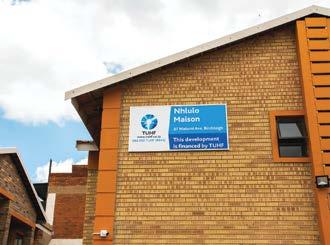
8 minute read
TUHF's approach demonstrates commitment to the inner city
TUHF's approach
demonstrates commitment to the inner city
A lack of service delivery in inner cities has become a major contributor to urban sprawl in South Africa. SA BUSINESS INTEGRATOR spoke to Sivan Govender, Operations Executive for TUHF, a specialised commercial property financing company that finances property investors exclusively in inner cities about the key issues.
What do you foresee happening if this crisis is not addressed timeously?
Sadly, lack of service delivery in the inner cities has become a major contributor to urban sprawl in South Africa. Though some municipalities are performing better than others, we’re seeing some degree of lack of delivery in all our funding areas.
This means that investors are increasingly cautious about investing in urban densification or regeneration projects because, without reliable basic services, it’s harder to attract tenants and retain them.
While TUHF and a few other large investors continue to invest in urban regeneration, our collective impact on curbing urban sprawl and uplifting communities in the inner cities could be much more significant.
For example, if local municipalities were doing more to maintain roads and pavements or ensure rubble from their maintenance work is removed more timeously, the inner cities would be more attractive to developers.
Slow delivery of planning approvals, occupation certificates and other municipal services are also a deterrent. We're finding that our investors are starting to look outside of the inner cities for development opportunities to diversify their risk.
I worry that a lot of the more seasoned investors, and even new investors, just get put off by all the red tape. With the lack of service delivery, some feel it's just not worth the effort and it's too risky.
How can TUHF help alleviate this problem?
TUHF is dedicated to urban regeneration and inner cities. We have a near 20-year investment record in the inner city, and we’re not going anywhere. We believe we’re operating in the right market – we have a R4 billion loan book that demonstrates our commitment to the inner city.
In recent years we have expanded our investment capacity, for example into townships through TUHF21's uMaStandi product, and we're continuously expanding our funding footprint into other areas. This is driven by the fact that we see potential in people and property that others may not see, rather than a loss of appetite for the risk associated with inner city investment.
We also remain committed to engaging with local government to resolve the challenges around service delivery. We know we're going to ruffle some feathers, but we believe it is part of our responsibility to our clients to put our weight behind these discussions.
How has the pandemic, and the workfrom-home model impacted the demand for commercial property?
TUHF’s focus is on affordable rental housing rather than on office space or other types of commercial property.
Though our market fared much better than most property sectors during the pandemic, it wasn’t immune to all the impacts. We saw an upsurge in vacancies during the hard lockdown, but we also saw good recovery as soon as it was lifted.
In fact, some of the metros we operate in are seeing much lower vacancy rates now than they had before the pandemic. Johannesburg, for example, had an oversupply of rental housing before the onset of the pandemic hit. Because the pandemic put a stop to a lot of building activity and new units coming online, that oversupply issue has corrected itself and we’re seeing vacancy rates reducing.
Providing units with work-from-home capability has become much more important in our market. Good, reliable WiFi is becoming essential when planning a development or refurbishment, for example. Good lighting and ventilation as well as cost-saving approaches to utilities, and other facilities are conducive to productivity in a workfrom-home scenario.
Is there a larger focus now on the residential sector?
I think there's certainly been an increase in conversions of non-traditional buildings into housing. I’m certainly engaging in more discussions with commercial property owners about converting mothballed office buildings into rental accommodation.
What role does TUHF play in enabling the development of student accommodation?
About 15% of our book is student accommodation, though this is also our limit for investing in this space. It is a market that must be approached carefully, because it’s susceptible to things like student protests or cash-flow challenges at the National Student Financial Aid Scheme (NSFAS), which can prevent the universities from honouring their contracts timeously.
Student accommodation can also displace more traditional inner-city tenants, and we feel strongly about keeping a balance here.
However, there is a strong need in some metros, and we work with our clients on identifying opportunities that lead to developing and providing good quality student accommodation.
Our approach is to future-proof the product by
strongly advising our clients to focus on traditional family apartments rather than dormitory type accommodation. We can structure repayments to accommodate the 10-month academic year. We also work with them to ensure their property property is configured in such a way that it can be easily adapted to changing demands.
For our student accommodation clients to have more security we need a relationship with NSFAS directly, and this is something we’re hoping to actively pursue for our next financial year.
What is TUHF’s Sustainable Bond Framework?
We launched our Sustainable Bond Framework and South Africa's first social
bonds, Urban Ubomi 1, in March 2021. Each of our social bonds issuance to date has been oversubscribed, so I believe there is an appetite for impact investing in South Africa.
When you invest in a local economy, like TUHF does, you stimulate local economic development in a neighbourhood sense. As we invest in inner cities, we are more likely to create employment, stimulate spending, contribute support for small businesses and in so doing grow local micro-economies in an inclusive way.
The Sustainable Bond Framework allows TUHF and its associated structured finance
vehicles to issue Green and Social bonds that support lending to qualifying projects. This ensures that the relevant impact that we have, such as providing funding in the affordable housing space and providing access to finance for small scale property entrepreneurs, is recognised.
Of course, it’s not just about the impact for us, or our investors. It’s important for us to show good returns on these investments along with the social impact.
We are well placed to take advantage of the opportunities in our niche. Our brand presence and reach, and our commercial resilience, all indicate a positive outlook for the organisation.
We’re happy that we’ve implemented what we had committed to in terms of our robust platform for growth, and the balance between bilateral loans and our securitisation structures are properly aligned to fund our R1 billion+ per annum growth goal. We now need to chart a way forward for growth.


Balancing quality and affordability lies at the heart of TUHF’s pragmatic optimism
Govender believes affordable housing should also be quality housing. His pragmatic approach to helping clients achieve this balance stems from his vast experience in property development and management, and a down-to-earth view of the positive impact TUHF can make in the areas that the impact focused organisation supports. "In my role as a national operations executive, I have found that I have to be able to change hats for each node we operate in. Understanding the uniqueness of each market TUHF operates in around the country is what enables us to help our clients build successful businesses," he says.
And this has always been critical to TUHF’s success. "Our specialist and unparalleled knowledge of the city is core to our ability to advise clients about the practicalities of their projects, so that they can make sound investment decisions. "It also allows us to make pragmatic lending decisions even as we seek to create impact through scale, and ultimately run a successful business. It also lies at the heart of our ability to spot potential – to be optimistic about the potential of an investment, project or a client. "As a property guy first, and a financier second, I consider it my duty to provide insight into the practicalities of building a successful project. If you know property, and the node you want to invest in, making informed, financial decisions follow naturally.
Govender's 5 property fundamentals for newcomers to property entrepreneurship:
1. Understand the node and the rentals, and what drives the needs of the community
These details can vary vastly from city to city, and even from node to node within a city. We always strive to share our knowledge of these variances with our clients, even before we agree to finance a project.
2. Quality of the asset is critical
Property is a long-term game. Often, we help our clients buy an existing asset and refurbish it, and this is the start of a 15-year relationship between us and them. The asset must be of a quality that it can service the loan and generate some profit for the client as soon as possible.
3. Finishes are key
When it comes to finishes, it is significantly important to be practical. The finishes chosen must be attractive, of good quality and have some longevity but they do not need to cost a fortune.
As an advisor to our clients, I consider it imperative not only to advise about the financial aspects of the project, but about the quality of the finished product and how to achieve this balance between quality, aesthetically pleasing spaces and affordability for the target market. This includes considerations around sustainable and green interventions that may be incorporated into the refurbishment and finishes. Heat pumps, for example, make a lot more sense in terms of affordability, reliability and longevity than solar geysers while also ensuring a positive impact on the tenants’ utility costs.
4. Hands-on property management
It’s vital for property entrepreneurs to stay on top of basic services such as security, cleaning, maintenance and so on. Simple things like damaged fences or unkempt common areas can be off-putting to tenants and it’s important to address them as they occur.
5. Good financial management
Whether property entrepreneurs manage these themselves or make use of an agency, good hygiene around rent collection and the overall management of the property’s finances can make or break a business. "If you follow these five simple concepts, it’s difficult to go wrong, and I bring this practical approach when advising and supporting clients," Govender concludes.










